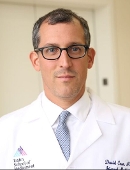My Child Has a Heart Condition. What Should I Do?

Becoming a parent is exciting, sometimes nerve-wracking, and comes with a heap of responsibility for the health and well-being of your child. And if your child has been diagnosed with a heart condition, anxiety can ratchet up due to the uncertainty of what the condition may mean for their future.
Robert H. Pass, MD, Chief of the Division of Pediatric Cardiology at the Icahn School of Medicine at Mount Sinai and co-Director of the Mount Sinai Kravis Children’s Heart Center, answers common questions that parents may have about diagnosing a pediatric heart condition and explains the safe, minimally invasive treatments that are now available.
How do I know if my child has a heart condition?
Many heart problems in children are obvious nearly from the moment of birth. In fact, the most common types of heart disease in children are congenital heart diseases, which are birth defects that affect how the structure of the heart as well as how the heart functions. Congenital heart disease is the most common birth defect, affecting a little less than one percent of the population.
One of the most common signs of heart disease among newborns is cyanosis, which is when a child has a low oxygen level, which lends a bluish tint to the skin and mucous membranes. Additionally, some newborns have symptoms such as poor feeding or sweating as they feed. Heart problems can also cause poor growth.
Still other concerns—like heart murmurs—are identified only through a physical examination or sonogram. Heart murmurs can be signs of a problem, or they can be what we call “innocent,” which means there’s actually nothing wrong. Some studies suggest that if a doctor listens closely enough, nearly half of all kids have murmurs. Fortunately, though, only a very tiny fraction of this group actually has a heart problem.
How are congenital heart diseases diagnosed and treated?
Most congenital heart conditions are diagnosed either on physical examination or ultrasound and increasingly can be diagnosed prenatally on ultrasound.
Depending on the diagnosis, there are a variety of surgical and non-surgical treatments for congenital heart disease. Non-surgical treatment or the “wait and see approach,” may be the best option for problems such as small holes in the heart and some forms of abnormal heart rhythm which can resolve spontaneously. If your child has a condition that needs surgical intervention, options range from open heart surgery to the use of catheter-based therapies.
What are catheter-based therapies?
Catheter-based treatment is a minimally invasive alternative to traditional open heart surgery in which small tubes are inserted into the blood vessels and allow for diagnosis and treatment of many heart problems. Among many conditions that can be addressed in this way, we use these procedures to close holes between the upper two heart chambers—called atrial septal defects. In the past, we routinely treated this condition with surgery. Now we manage about 75 percent using catheter-based treatments.
During a catheter-based procedure the thin, flexible catheter is inserted through the child’s groin into a blood vessel and up to the heart. A device is then introduced through the catheter to seal the hole. With open heart surgery, the child would spend two to four days in the hospital and another six weeks recuperating at home. Using this minimally invasive approach, most patients are in the hospital only one evening and then back in school within three or four days.
What makes the Mount Sinai Children’s Heart Center special?
Our Children’s Heart Center stands apart due to the integration among our services throughout the expanded Mount Sinai Health System. Our cardiology team works closely with our surgical team, and we seamlessly transition our pediatric patients into our very large and always growing adult congenital heart program headed by Ali N. Zaidi, MD, Professor of Medicine (Cardiology), and Pediatrics; Director of the Adult Congenital Heart Disease Center; and Director of Pediatrics to Adult Transition of Care Program, at Icahn Mount Sinai. We view our work as a team sport, with many players working together to achieve the best possible outcome.
We develop individualized treatment plans for children with a wide range of heart problems, always taking into account the needs of our patients and their families. While there are outstanding cardiologists in many of the major centers in New York City, I have never worked with a group where every single physician is outstanding. It is inspiring for me and keeps me on my toes. Our patients inspire us every day.



